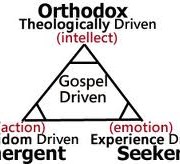Hey everyone, Daniel here. So about a week ago, I walked into our bedroom and my wife, Lynn, was furiously typing on her computer. When she finally looked up, she said, “I am writing an article for the wives of church planters.” Then she proceeded to return to her furious typing. Lynn has been involved in the three churches that I have had the pleasure of seeing launched. We got married when Calvary New Brunswick was very young. She was integral to the launching of both Calvary North Bay and Calvary San Francisco. In both plants, she first started the children’s ministry and then after turning them over to capable leaders proceeded to start the women’s ministry (which she also started in New Brunswick). She did all this while we had small children. Not to mention that we got married not for her ministry prowess but to be companions in this life (which she has excelled at). It is fascinating for me to read about these things from her perspective. There’s a lot of road-tried wisdom here from my beloved bride.
Hello Ladies, if you are reading this than you are among the many that the Lord has placed warmly on my heart. Over the years I have watched my husbands joy at encouraging men with hearts to serve the Lord in church planting. I have rejoiced in my own heart at his articles knowing that any information and encouragement goes a long way. Recently, it has been coming to my spirit the brave women who stand beside their men. YOU. Some of you out of obedience to the Lords calling, some with the same heart as your husbands for the area and some because they married into an early church plant like I did. My desire is to share with you things from my personal flight over the last 8 years as a church planters wife with the heart that you will be strengthened and encouraged.
1. Plow hard, reap later
In a church plant, you generally have to start from nothing. You find a building to hold services, if you are lucky you find someone to lead worship, and you make sure you purchase your own coffee pots 🙂 Starting from nothing generally means that there is A LOT of hard work involved that may last for a couple of years, so get ready! My role has always been to get the children’s ministry up and running and then later the women’s ministry. That generally means teaching every Sunday, or doing nursery every Sunday. I remember here in California I did the nursery and kids church at the same time for a year as my son was the only child nursery-age there. I remember balancing the two simultaneously. As I taught the lesson, frequently, I would hear one of the children from kids church say, “OBADIAH!! Lynn, he’s at it again!” as Obadiah (my active two year old) joyfully dug in the large potted plant in the room we were renting.
As I look back over all those years and then again more recently with our church plant in San Francisco, I can see how the seasons change. In the beginning years you have to work really, really hard. This may mean that you are in charge of teaching Sunday school every week even when you are sick, it may mean that you are trying to find the balance of leading 2 ministries at the same time, it may mean that you “feel” like you are doing everything except preaching the message! IT WON’T ALWAYS be this way!! A season will come when God will bring nursery workers, a team of kids church teachers so you aren’t teaching every Sunday. Men and women who feel called to those very positions that you were working so hard in. You must plow through the hard ground before the seed can be sprung!
2. Show up! Show up! Show up!
One of the many exciting things about a church plant is that you NEVER know what God is going to do! You may have Sundays where its just you and your husband having church together in a big empty room. Or, you may have Sundays where the room is full. In church plants there is usually an ebb and flow in the congregation.
There will also be mornings where you just don’t want to go. Your mind, or body will say, “no one will really miss me today”. I have found from experience that on the days that you show up when you don’t feel like showing up, God generally has “something special” planned. It could be a conversation with a woman who just had a really bad week and just needed someone who cared to share God’s love on her or it could be that you bless your husband’s heart with out even knowing it because he just needed the support of knowing that his wife was in this just as much as he is.
Commit yourself to going and lean on God’s amazing GRACE when you are weary.
3. Be a Servant First
I will never forget the experience I had on our 2nd church plant here in Mill Valley. We had moved to California leaving our New Jersey church family behind. The NJ folks had adored my 2 year old son Obadiah. They had watched my tummy grow round with child and then came and celebrated his arrival. It was the usual custom after church for Obadiah to take turns asking some one in the church family to pick him up, so that he could reach the donut holes that everyone always brought. We left our NJ church as “the beloved” pastors family. I didn’t realize how much I took that for granted, nor how much I expected that to be the same in our next church-plant family. I was surprised and hurt when several of the ladies of the church did not like my son because he was so active. Many made a point to tell me how to mother and then went on to talk about his “behavior” to others. My heart was bruised. I went to the Lord and said “OUCH!! HELP!!!” (among other things in that conversation!)
The verse the Lord ministered to me was, “Let this mind be in you which was also in Christ Jesus, who, being in the form of God, did not consider it robbery to be equal with God, but made Himself of no reputation, taking the form of a bondservant, and coming in the likeness of men. And being found in appearance as a man, He humbled Himself and became obedient to the point of death, even the death of the cross. (phil 2:5-8)”
What He was sharing with me was to be a servant first. Our family had a beloved reputation in NJ. Here in this church plant, I was to look at any area that needed help and then I was to jump in and work at it with all my heart and not expect anyone to love me, or my sweet family because of it. I was to do it all to please God’s heart for He saw me and was well pleased. Knowing this was my greatest reward.
4. Check it at the Door
I had to learn this lesson very early in our New Jersey ministry. As a pastor’s wife your role is to be there for people to talk with, rejoice with, cry with and encourage. In order to be available to the public YOU MUST check your own emotions at the door. What this means is that any un-resolved conversation, conflict, situation that you had at home or on your way to church, you need to give it to GOD. You need to “leave it at the door” before you walk into church so that you can be available to others. I remember countless times in New Jersey where Daniel and I would get into an argument right before we left for church and I would be FUMING inside when we reached church. Often times replaying the argument or conversation in my mind. I would “smile” at those around me but inside I felt down, angry or whatever the emotion inside me was. At those times I saw I was unavailable to minister because I was too consumed with my own thoughts or feelings than to engage with others.
You must leave your own “stuff” behind and trust that GOD will give you the grace you need to be available to others and the grace to resolve the issue that you are bothered with. He cares and loves you.
God understands the weight of the role He has called you to and wants to fill you with grace to move in it. But first you must leave it with HIM.
5. Obedience first, Heart later
The year and half spent on the San Francisco church plant was a tough year. I remember a couple of months before we opened the church to the public, the Lord had given me a vision. He revealed to me kind of warfare that we were going to encounter by planting a church in San Francisco, He did this to prepare my heart. The months to follow were rugged with personal warefare. Feeling beaten up by life, and having just handed the childrens minstry coordinator postion over to a young woman in the church, I was tired and my spirit run down with the battle.
That month the Lord started to gently speak to me about starting the women’s minstry. He was gentle. A loving poke here. Another loving poke, poke there. I ignored it. “I can’t Lord” I said. “I’m struggling as it is, let alone leading another ministry, I just can’t”.
The women who had approached me with the desire to start a ladies ministry, bonded together and hosted the first women’s ministry event. The attendance and joy in the air was abundant. On my way home from the event my heart burned with this desire. I kept crying out to the Lord “if there is going to be a ladies minsitry, it has to have MEAT for the girls to chew on!!” Again I felt the “POKE!”. “ALRIGHT!!!” I said. Was it easy? NO. Did I want to always show up? NO. But I KNEW I was called. I KNEW that I was doing what God had asked me to do, and I had my husband’s support. Even though I was in a rough season personally, the Lord gave me a heart for the ladies. I loved them and when it was time to turn the ministry over, I was sad to say goodbye to their hearts.
At times God is going to ask you to do something, maybe lead a minstry, maybe support your husband in the ministry even though you don’t feel ready for it, or something else….but you will find that if you obey and do what you know He is asking, He will eventually give you His love for the service HE has called you to.
There is nothing greater in my heart than knowing I did what I knew I was called to do, even if I didn’t think I did the greatest job of accomplishing it. I obeyed my FATHER.
6. Understand the Ministry that you are called to
I remember when I began the Ladies Ministry in Mill Valley, the Lord had given me a picture in my heart of the kind of women’s minstry he wanted. For this season He wanted a time where younger women and the older women study the Word and pray together. Through this example the younger women would learn by being surrounded by the older women of the church. My heart had such peace at this picture. However, I had one lady who did not like this “type” of ladies ministry. She used to call me often and tell me her strong opinions. Being younger than her I questioned myself, some times stressed that I wasn’t doing the right thing, etc. However this is what I learned: When God has called you to lead a ministry, ask Him for his vision and upon receiving it, stick to it.
You will have MANY women come to you with “great ideas” of how you “should” lead the ministry, and “great ideas” of the kinds of events you should host, but with an open heart you always need to go back to the Lord, and ask if these support HIS vision for the ministry He has called you to.
7. Know your Personal Weakness and put your armor on
We ALL have a personal weakness(es) in our characters that if left un-checked can be harmful to the minstry. Examine your heart and know what they are!! These areas will be the first areas that Satan will go after and try to use to derail your minstry and your husband’s mininstry. Whatever your weakness is, you must find a way to put your armor on so that it’s put into check.
8. Your Children
Church planting with young children can be very challenging. Obadiah was 2 years old when we started the Mill Valley church plant, and 5 and a half with the San Fransicsco church plant. Maranatha was 2 and a half years old. I would find I would come home from the church day tired and worn out, just wanting to put on a video on and not think which can not be the case when you are a mommy. You are on til they go to bed 🙂 Give yourself and your children grace. Acknowlege often that its a season in life just like having a baby. Takes time for the baby to grow before it needs you less.
One practical solution that we found was to hire a babysitter to watch our children during the fellowship time at church. This way our children could do laps around the hall under a watchful eye, freeing me up to minister to the body uninterrupted.
9. Find a “Seasoned” Pastors Wife and ask her to mentor you
As wives we want to share everything with our husbands. We want to ask them for their opinions, their thoughts, their ideas. This isn’t a bad thing. We are their wives after all! However, the enormity and weight of responsibilty that your husband carries in a church plant is unfathomable. I believe the Lord is the only one who truly understands this enormity.
Our husbands don’t want to spend extra brain space having to come up with ideas for another ministry. He has asked you to lead this particular ministry so that he doesn’t have to think about it. This is why it is so important that we seek out another pastors wife, who has been there “before”. Someone who you can run ideas with, someone who will teach you what has worked for them, someone who will encourage you in the new rode that you are on. Ask God to lead you to this woman. Remember God WANTS to help us!
10. Find a Prayer Partner
Whether its once a week, or once a month, find another woman whom you can share your heart with. Someone who is NOT in the church body. A woman who you can be yourself with and feel the freedom to be raw with when you feel down or discouaged. This special friend needs to be someone who has a heart for the Lord and will commit to pray with you. I know that these friends are SO hard to find. Ask God to reveal the right person for you. Some times this person will be the LORD HIMSELF until the time he brings you another.
11. You are in a Spiritual Battle
Its soooo easy in the midst of plowing hard, for your mind and heart to get discouraged,and apathetic. We forget to look at the whole picture. The picture being that we are doing is work for THE KINGDOM through faith. The enemy doesn’t like KINGDOM work. He HATES it and will try to detrail you, discourage you, give you a spiirt of apathy, anything to have you stop showing up for God. Saturday afternoons and nights in our home are generally not too much fun. Its the day of the week where marital fights brew, the car breaks down, the children won’t stop aruguing or you get sick. Do you get the picture?? And if your husband teaches a mid-week, its the same the day of the midweek. WE MUST LEARN how to wear our armor properly and to put it on every day.
12. Cast your cares on God for HE cares for you!!
Most importantly, guard your private time with HIM. A dear friend of mine recently shared something with me that the Lord shared with her. God told her to “measure the worth of her day by how much time she spent with Him in prayer and in His Word”. WOW right?! We NEED GOD!! We are NOTHING without Him. HE sooo much wants to fill us, help us, love us, make us laugh and smile, give us gems to give to others. He wants us to bring and lay down our burdens at HIS feet so that He can make us whole. He wants to impart HIS wisdom and His nature to us. Give Him that chance ladies! MAKE TIME for your Savior!!











